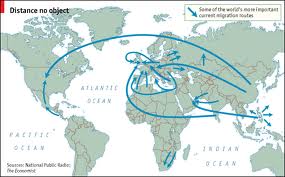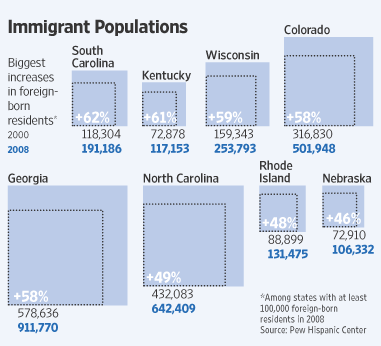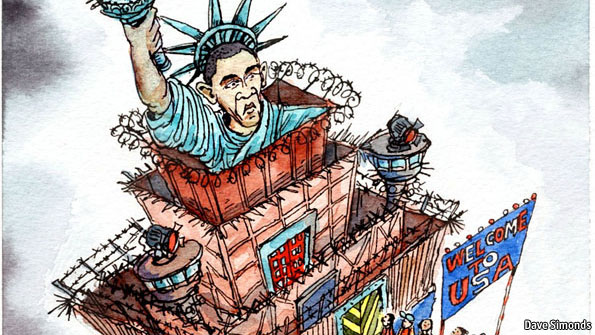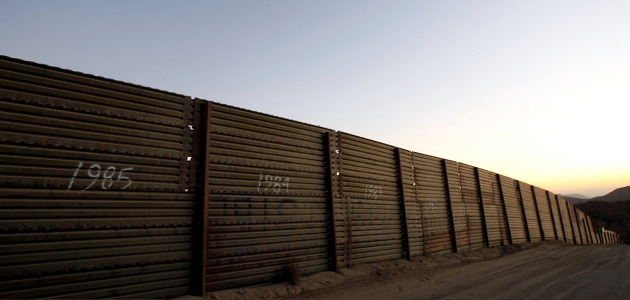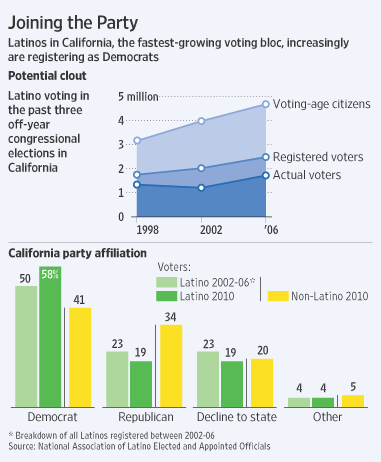America Without Latinos - The Cost to our National Economic Resilience
 Friday, February 19, 2016 at 5:35PM
Friday, February 19, 2016 at 5:35PM 
Put it all together and you get the new normal in which (a) two of the leading GOP contenders are Hispanic (Cruz, Rubio), (b) no one really talks about that being novel (the leading part most certainly is), and (c) both are considered "tough" on illegal immigration. Then again, we also see Donald Trump on top of many polls, and he has most definitely tapped into white discomfort over the rising Latino quotient. Thus, if the Democratic side of the campaign seems very class focused, the GOP side (for now) seems very identify-focused (the whole "real"/"true" America vibe).
Neither party's focus should be a surprise, given how globalization has challenged and changed America's socio-economic landscape since the Cold War's end. There is little doubt that the nation continues to endure a period of great transition. But it's one I can spot all around the world.
Most of us tend to view the world in East-West or longitudinal terms, but I see that changing in the years and decades ahead, shifting to more of a North-South or latitudinal perspective.
- Northern populations are aging, while Southern populations remain youth-skewed. That alone puts people on the move, overwhelmingly northward. We're watching that now in Europe, but it's really a global phenomenon.
- Climate change will only turbo charge this people flow, because it'll become that much harder to live and grow food in equatorial regions. Additionally, warmer temperatures and milder seasons in the North will push habitation and agriculture northward.
- Revolutions in energy production will render regions less dependent on longitudinal flows, something we're already witnessing with the US.
- Age imbalances between North and South will be matched by economic growth disparities (younger economies, on average, grow faster), leading the North to seek further trade and economic integration southward.
Add it all up and I see an America far more focused on the Western Hemisphere in this century, resuming a southward integration dynamic that was there, roughly a century ago, only to be hijacked by global geopolitical events (WWI, WWII, Cold War, OPEC's rise). I could say that it's only natural for this north-south reorientation to return, given that the fastest growing economies will be found in the South in coming years and decades. But I could also say it was inevitable given the already high rate of economic/trade/financial integration that exists east-west. Thus, the north-south reorientation is both what's next and what's left.
It will also represent - as always - our economic system's instinctive reach for that which will most increase our national resilience in the future.
As evidenced by this year's presidential campaign, that tectonic shift in US perspective will be politically tumultuous, and, by that, I mean, replete with "shocking" revelations and realizations of just how much has already changed. We're just such a laissez faire system that we're constantly "waking up" and discovering things that have been in the works for decades, right under our noses.
A classic way to explore such new understandings is to employ a "counter-factual" - i.e., to explore the completely opposite scenario in which the newly dominant element of reality never really happened. A classic example: what if the US had never entered WWII and the Nazis still ruled Europe?
So, no surprise in seeing such counter-factuals being deployed as political tools with regard to the profoundly pervasive role already played by Latinos throughout much of the US economy.
Today, in my town of Madison WI, we witness the following political demonstration, as reported by a local news channel:
Organizers of "A Day without Latinos and Immigrants" are calling for businesses and individuals to assemble at the state Capitol at 10 a.m. Thursday to protest against what they say are two anti-immigration bills being considered by the Legislature.
One bill would address the issuance of local ID cards by local governments to immigrants. The second bill would prohibit municipalities from creating laws restricting law enforcement officers from inquiring about the immigration status of people whom they contact.
In asking businesses to close their doors on Thursday morning, organizers are hoping to illustrate the void that would exist in the community if Latinos were not participating in the economy.
“I think that’s what mainstream America has to understand, that the Latino, that the immigrant community is highly important to the contributions, and Latinos want to contribute. Latinos, all we want is one word, and that is opportunity,” said Luis Montoto, programming director for La Movida, the only Spanish-language radio station in the community.
Organizers said they have commitments from local restaurants, grocery stores, tax preparation firms and other businesses to close on Thursday in support of the protest. They also expect construction, hotel, manufacturing and farm workers to attend the protest.
Madison Mexican food favorite Taqueria Guadalajara is participating. Imelda Perez, manager of the restaurant on Park Street, said the bills attack immigrants, and she believes closing the restaurant will serve as a wake-up call.
“People will come here to the door, and they ‘ll try to have lunch, and the door will be locked, and then people will realize how important we are,” she said.
The image above is from a 2004 movie based on the same counter-factual premise:
When a mysterious fog surrounds the boundaries of California, there is a communication breakdown and all the Mexicans disappear, affecting the economy and the state stops working missing the Mexican workers and dwellers.
Could other ethnic-immigrant groups have made the same claims during previous periods of America's national history? Absolutely. A great deal of America's economic resilience over its history is owed to various influxes of labor (both slave and free) that were subsequently exploited by the system for all they were worth (or could stand before organizing themselves politically for better treatment). Our ability to process such immigrant waves is our primary social-resilience skill. This time will be no different.
So yes, expect all manner of "push" from the native-born population in coming years, along with all manner of "shove" coming back from the foreign-born population. This is not the first such stressing political dynamic in US history and it certainly won't be the last.
But it will, I predict, be the one that re-orients America's vision of its future from a predominantly longitudinal perspective to a more latitudinal vision.
And we will be stronger as a nation as a result.















